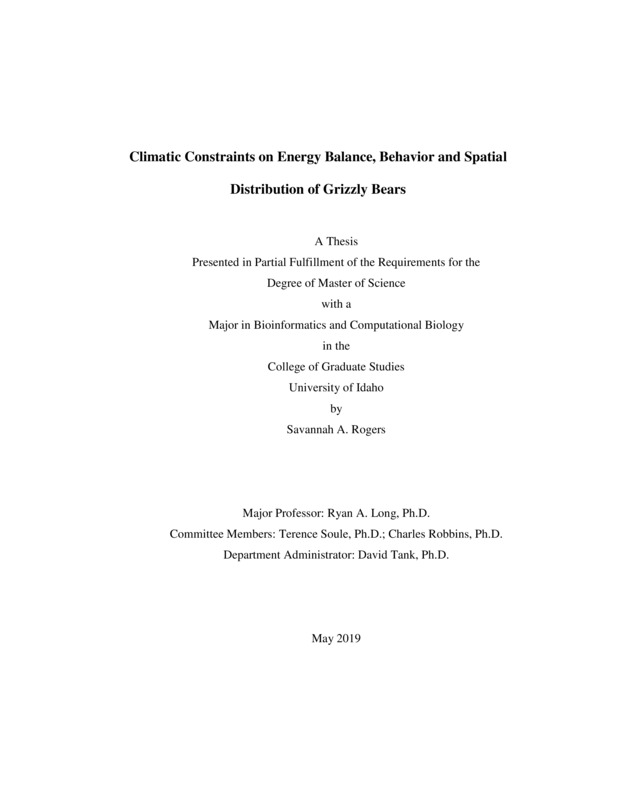Climatic Constraints on Energy Balance, Behavior and Spatial Distribution of Grizzly Bears
Rogers, Savannah Alicia. (2019-05). Climatic Constraints on Energy Balance, Behavior and Spatial Distribution of Grizzly Bears. Theses and Dissertations Collection, University of Idaho Library Digital Collections. https://www.lib.uidaho.edu/digital/etd/items/rogers_idaho_0089n_11594.html
- Title:
- Climatic Constraints on Energy Balance, Behavior and Spatial Distribution of Grizzly Bears
- Author:
- Rogers, Savannah Alicia
- Date:
- 2019-05
- Keywords:
- genetic program grizzly bear heat dissipation limit theory metabolic species distribution thermal ecology
- Program:
- Bioinformatics & Computational Biology
- Subject Category:
- Wildlife conservation; Ecology; Computer science
- Abstract:
-
Although the influence of environmental variation on energy balance of endotherms is well understood, the degree to which climate directly constrains energy available for reproduction in large mammals has received comparatively little attention. We used a combination of biophysical and algorithmic modeling to examine the impact of temperature variation on rates of metabolism and water loss of lactating and non-lactating female grizzly bears, Ursus arctos. Our goal was to understand the conditions in which warm temperatures constrain activity (both timing and intensity) and to quantify the relative importance of regulatory behaviors for maintaining heat balance. We used the mechanistic modeling software Niche Mapper to predict energetic costs incurred by female bears in early and late summer under current (measured) climatic conditions, as well as under conditions predicted by the IPCC (i.e., 2.5o-C increase in mean temperature). When bears were allowed access to “bathtubs” (i.e., pools of cool water) to facilitate cooling they were able to maintain homeothermy under a wider range of conditions throughout the summer, especially under simulated climate warming. The relative benefit of bathtubs was greater for lactating females because of the additional endogenous heat generated by lactation. Our results suggest that behavioral mechanisms for minimizing costs of thermoregulation are likely to play an important role in the ecology of grizzly bears at the southern extent of their range under current conditions, and that increasing temperatures have the potential to constrain energy allocated to reproduction by grizzly bears. To explore this possibility further we used an algorithmic modeling approach to evaluate the relative influence of costs imposed by the thermal environment on the spatial distribution of female grizzly bears. We developed a Genetic Program to predict the relative contribution of a suite of environmental variables to the distribution of lactating and non-lactating female bears in the Greater Yellowstone Ecosystem Grizzly Bear Recovery Zone. Although our model results did not indicate that variation in the thermal environment is a more important determinant of grizzly bear distribution than other environmental factors under current climatic conditions, they did show that spatiotemporal variation in costs of thermoregulation have a greater influence on the distribution of lactating than non-lactating female bears. This result is consistent with predictions of the Heat Dissipation Limit Theory and has important implications for the distribution and performance of grizzly bear populations in the GYE as the earth’s climate continues to warm.
- Description:
- masters, M.S., Bioinformatics & Computational Biology -- University of Idaho - College of Graduate Studies, 2019-05
- Major Professor:
- Long, Ryan
- Committee:
- Soule, Terrence; Robbins, Charles; Lee, Stephen
- Defense Date:
- 2019-05
- Identifier:
- Rogers_idaho_0089N_11594
- Type:
- Text
- Format Original:
- Format:
- application/pdf
- Rights:
- In Copyright - Educational Use Permitted. For more information, please contact University of Idaho Library Special Collections and Archives Department at libspec@uidaho.edu.
- Standardized Rights:
- http://rightsstatements.org/vocab/InC-EDU/1.0/

